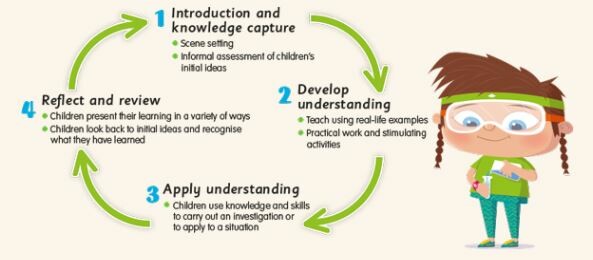Science
At Flanderwell we strongly believe that Science should help spark imagination, fuel curiosity and nurture inspired and confident young scientists. We know that children construct understanding of the world through experience. In order to make learning real children need to explore, ask questions, and assess their understanding. Our curriculum is based on a robust teaching and learning cycle that puts children and hands-on active learning at its heart and ensures progress for all

Our Curriculum
We follow the Twinkl Science scheme, which sets out the aims and programmes of study for Science ensuring that our curriculum coverage is consistent across year groups and key stages, whilst also ensuring that disciplinary knowledge is built upon each year. The purpose of this, is to ensure that all teachers are able to support pupils in developing their own knowledge and understanding about Science, resulting in them being able to make appropriate links to learning within the community and throughout their lives.
Primary Curriculum
|
Year 1 |
Year 2 |
Year 3 |
Year 4 |
Year 5 |
Year 6 |
|
|
KS1 Working Scientifically |
LKS2 Working Scientifically |
UKS2 Working Scientifically |
||||
|
Biology |
Types of Animals
Parts of animals (including humans)
|
Feeding and Exercise (including humans)
Living Things 2 |
Movement and Feeding(including humans) |
Human Nutrition |
Life Cycles
(including changes in humans) |
Our Bodies(Circulation, healthy living and transport of water and nutrients) Evolution and Inheritance |
|
Habitats
Living Things(Things that all living things have in common) |
Dangers to Living Things
Grouping Living Things |
Classifying living things |
||||
|
Plants (identifying and structure) |
Growing Plants |
Parts of a Plant (structure and function) What plants need |
||||
|
Chemistry |
Comparing Materials
Identifying Materials |
Changing Shape
Uses of Materials |
Changes of State |
Separating mixtures
Types of change
Materials |
||
|
Rocks and Soils |
||||||
|
Physics |
Changing Seasons |
Earth and Space |
||||
|
Electricity |
Changing circuits |
|||||
|
Light and Shadows |
Forces |
Light and sound |
||||
|
Magnets and Forces |
||||||
|
Sound |
||||||
Aims
Our aims are to ensure that all pupils:
- develop scientific knowledge and conceptual understanding through the specific disciplines of biology, chemistry and physics
- develop understanding of the nature, processes and methods of science through different types of science enquiries that help them to answer scientific questions about the world around them
- are equipped with the scientific knowledge required to understand the uses and implications of science, today and for the future.
Knowledge
In order to achieve the above aims, children will be taught a range of disciplinary knowledge within each area of Science:
An example of the knowledge (Year 4 – Animals including Humans)
- Animals have teeth to help them eat.
- Different types of teeth do different jobs.
- Food is broken down by the teeth and further in the stomach and intestines where nutrients go into the blood.
- The blood takes nutrients around the body.
- Nutrients produced by plants move to primary consumers then to secondary consumers through food chains.
Examples of Our Science Curriculum Documentation
Science Long Term Plan
Flanderwell-Science-LTP-Overview-.pdf
We have created child-friendly assessment documents for each subject, where the most important knowledge has been broken down. This is so children can see what they need to learn by the end of each term and by the end of the year. See below for some Science child-friendly assessment examples.
To support children with their learning in Science, Pupil Guides have been created for each year group and each unit of work. These are there to support children with remembering what they need to know for each unit. See below for some examples.
